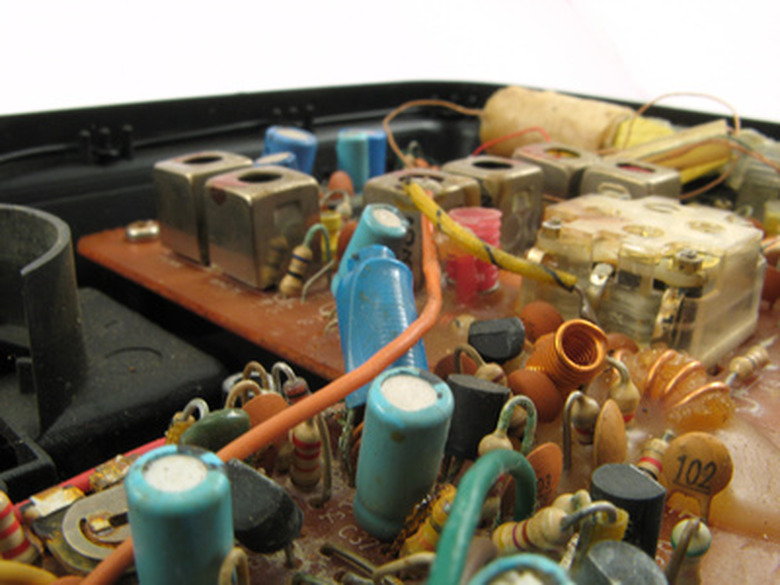What Is Basic Electronics?
Electrons, a component of atoms, and their use—known as electronics—play an important role in many pieces of household equipment. Basic electronics comprises the minimal "electronics components" that make up a part of everyday electronics equipment. These electronic components include resistors, transistors, capacitors, diodes, inductors and transformers. Powered by a battery, they are designed to work under certain physics laws and principles. Basic electronics also concerns the measurement of voltage, current (electron flow) and resistance in the assembled working "circuit."
Principles of Electronics
Principles of Electronics
All electronics equipment works on a fundamental physics principle known as Ohm's law, which states that a circuit contains a voltage directly proportional to the current and resistance encountered by the current in that circuit. The circuit comprises the electronic components also known as circuit elements, linked with wires to a battery and designed to obey Ohm's law.
Power Supply
Power Supply
The battery produces the voltage and current that drives or powers the electronic components. The electrons flow through wires and are modulated by the arrangement of the electronics components to produce specific results. The voltage is measured in units called volts and the current in units called amperes, or amps.
Resistors
Resistors
The resistor is a circuit element designed to offer resistance to the flow of electrons called current. In so doing, it produces heat and, in turn, dissipates power—a resistance multiplied by the square of the current. A heating coil is an example of an application of a resistor. Arranged in series, resistors have an additive value (that is, the circuit's total resistance equals the sum of all of the resistors' value). Arranged in parallel, their combined value diminshes. The unit of resistance is the ohm. In practice, we have kilohm and megaohm units.
Capacitors
Capacitors
Capacitors are circuit elements that represent the opposite of resistors: They store electrical power. Their capacity is measured in farads and practical subunits of a farad such as microfarad and picofarad. When arranged in parallel, their combined value increases. When in series, their combined value diminishes. Basic electronics circuits always include some capacitors.
Diodes and Transistors
Diodes and Transistors
The diode, a circuit element, encourages current to flow in only one direction. It has two terminals, unlike the transistor—which has three. In the transistor, current can flow in more than one direction. Both diodes and transistors modulate current direction and voltage.
Inductors, Transformers and RLC Circuit
Inductors, Transformers and RLC Circuit
Basic electronics circuits often include inductors and transformers as circuit elements. An inductor is a coil of wire that produces a desired magnetic field, unlike a capacitor, which produces a desired electric field. When coupled with a resistor and capacitor, an inductor contributes to a special "tuning" circuit, called an RLC circuit, which can be tuned to various frequencies as electric current flows through it. Transformers, another type of circuit element, can step up a voltage or step it down to desired values. All these circuit components make up what is generally called "basic electronics."
Measuring Instruments
Measuring Instruments
Basic electronics is not complete without mention of the basic instruments used in electronics measurements. These include analog and digital meters that measure voltages, current, resistance and capacitance; power supplies, which provide stable regulated voltage and current; oscilloscopes, which measure circuit waveforms from circuits; and function generators, which provide standard desired waveforms.
Cite This Article
MLA
PaulI, O. "What Is Basic Electronics?" sciencing.com, https://www.sciencing.com/what-is-basic-electronics-13580662/. 18 September 2017.
APA
PaulI, O. (2017, September 18). What Is Basic Electronics?. sciencing.com. Retrieved from https://www.sciencing.com/what-is-basic-electronics-13580662/
Chicago
PaulI, O. What Is Basic Electronics? last modified March 24, 2022. https://www.sciencing.com/what-is-basic-electronics-13580662/
